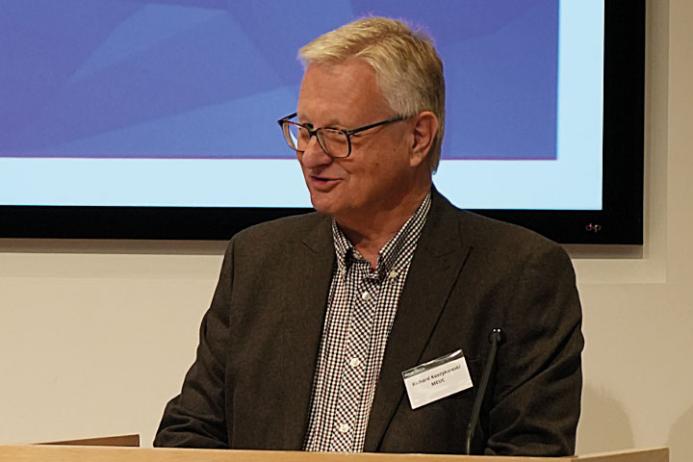What is happening in the UK energy market and what are the options for energy users?

First published in the September 2025 issue of Quarry Management
By Richard Koszykowski, energy advisor, Major Energy Users’ Council
Over the next few months some two out of three commercial energy users will be signing another electricity or gas supply contract. This is known as the ‘October’ round. Today, end-users coming out to tender should find suppliers actually showing some interest. The impact of Covid and the sky-high energy costs of the early 2020s have slowly diminished and we have moved some way away from being forced to renew with our existing suppliers. The situation was compounded by almost no new suppliers entering the market over the past five years, with consequently little real competition and government intervention on fixing energy costs.
So, what should energy users be aware of in the run up to the October round, or simply, what to keep an eye out for with regard to replacing or renewing future contracts? Energy costs are substantially lower than they were a few years ago but, as everyone is aware, still substantially above where they once were. Currently, wholesale baseload electricity costs are trading higher for this winter season, at approximately 8.4p/kWh, then next winter at 8.1p/kWh and 7.6p/kWh for 2027. Gas has a similar trend with this winter at 3.2p/kWh, next winter at 3.1p/kWh and 2.8p/kWh for 2027. And remember, costs are changing every day, so at the moment it is cheaper further out.

Non-energy costs include those taxes and levies that the Government imposes on end-users along with the costs national and local infrastructure providers charge to get the electricity and gas to your locations. Typically, for larger electricity users with half-hourly metering, the split between wholesale costs and non-energy costs is around 50/50. Non-energy costs will only rise as we endeavour to achieve ‘net zero’ and significantly increase our use of renewable energy. In particular, the cost of ‘balancing the grid’ because of our growing use of wind and sun is rising in a dramatic manner. Unless you have on-site generation, these costs are very difficult to avoid.
If you are going to tender this year you need to decide what your procurement strategy looks like. There is always much discussion about creating an effective risk-management strategy. Ultimately, this depends on the nature and importance of energy costs to your business and its bottom line.
Today, there are numerous procurement options in the marketplace. These range from a traditional annual fixed price per kWh, including all non-energy costs, to pass-through options, flexible contracts, and corporate power purchase agreements. Such options can range from relatively simple contracts to agreements that need serious professional help and guidance and can include contractual commitments that vary from 12 months to 20 years. So, how important is buying green energy to you and your corporate image? What about security of supply; should you be putting up solar panels or wind farms or do you know someone nearby that is? Do you want to buy all your requirements in one hit or go small and often? What resources do you have that can effectively manage your energy contracts?
Each of these options has an upside and a downside. Fixed-price contracts with fixed terms probably provide the least effort and demand on procurement activities, but they come with a mix of disadvantages. Picking the best day to accept a fixed-price contract is usually identified with a 1 in 240 probability of success. Your credit rating will need to be ‘good’ for a supplier to procure your requirements for 12 months let alone 24 or even 36 months. Security deposits are a likely scenario.
Fixed-price contracts are relatively expensive. Suppliers will build in significant risk premiums for not only how much you expect to use, but the impact of time-of-use distribution costs, what part of the year you consume, and how good your credit rating looks, to name just a few issues. Terms and conditions regarding such elements as penalties for under or over forecast consumption can also add unbudgeted costs.
Is this a lock up and leave it for a year or two solution? Not really. Monitoring the energy market is a prerequisite of renegotiating a contract when the market offers an acceptable price rather than waiting for the contract to terminate. Constant vigilance, regardless of the strategy adopted, is a prerequisite.
Pass-through contracts, ie fixing wholesale energy costs but removing the risk to suppliers of non-energy costs should be significantly cheaper than traditional fixed-price contracts. But, your costs will vary, delivering less budgetary certainty and bill validation will be more complex.
Flexible contracts give ‘total’ control of energy procurement. They can be as flexible as required and can vary from buying a day, week, month, quarter, season, and years ahead. As much as the organization requires can be fixed ahead (a reasonably common approach is to fix 50% of the coming 12 months and buy the remainder automatically on the last trading day of the month-ahead market). This provides the benefit of buying nearer to the point of consumption. But, ongoing forecasting of future consumption cannot be avoided.
Finally, corporate power purchase agreements (PPAs) are apparently the answer to many prayers. PPAs are long-term financial instruments. They can be on site or virtual. However, using such a strategy demands a huge amount of effort across not just procurement, but also legal, finance etc, and will take many months to conclude. They may deliver better long-term price stability over a 10- or 20-year period and provide less risk and security of supply for green energy. However, there are no guaranteed savings against the market and typically a take-or-pay clause will be present, so this is not for organizations with a variable or unpredictable energy demand.
Effective energy procurement is a complex and demanding activity that requires serious skills and experience. Many organizations have turned to energy brokers, although recent government consultations point to serious formal concerns over end-users paying brokers far more than they envisaged.
The Major Energy Users’ Council (MEUC) is an energy ‘community’. It is not a broker and does not receive commission from suppliers. Members include many of the largest industrial, commercial, transport, and public sector organizations in the UK. Members have unlimited access to experts within MEUC on any procurement subject, from billing issues to procurement strategy and online training etc. The community provides the ability to tap into some of the UK’s best energy buyers at no additional cost, all for less than £300 per month.
Visit the MEUC website (www.meucnetwork.co.uk) and/or attend one of MEUC’s three webinars in September. Better still, if you wish to meet with MEUC members and key energy suppliers and service providers, visit Buying & Using Utilities Live on 15 October 2025 at the AMTC in Coventry and get some unbiased answers. Attendance at the webinars and the face-to-face event is free.
Subscribe to Quarry Management, the monthly journal for the mineral products industry, to read articles before they appear on Agg-Net.com








